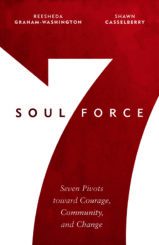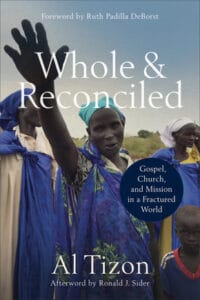
The sunlight on Robben Island is exceedingly bright as it reflects off limestone. A thirty-minute ferry ride from Cape Town, South Africa, on the mainland, Robben Island is the site of the high-security prison where Nelson Mandela spent eighteen years for his opposition to the apartheid system. The quarry where prisoners like Mandela once labored still exists. There, in an unrelenting sun so bright that it actually blinded some prisoners, Mandela and other political prisoners and dissidents dug up and broke apart rocks in hard labor that is difficult for us to imagine.
We had both traveled to South Africa with a group of national faith leaders to dialogue with South African leaders about the common struggles we faced. We were both feeling tired, emotionally and physically, from the community work we were each doing in Chicago, where we both run national nonprofits. Yet here we were, having traveled nineteen hours to the tip of the African continent to find some inspiration. We visited several faith communities and met brilliant women and men who were doing innovative work. Although apartheid had formally ended twenty years earlier, the effects of poverty and racial segregation were still very much apparent. The apartheid system had economically depleted Black and colored communities, in many cases robbing them of their land and livelihoods and creating a vacuum that was currently being filled by drug trafficking, prostitution, and gang activity. While learning this history and hearing people’s stories, we saw many parallels with the issues plaguing our own city.
While learning this history of South Africa and hearing people’s stories, we saw many parallels with the issues plaguing our own city.
We were feeling the weight of all this when we arrived at Robben Island, not fully prepared for what we were about to encounter. Walking the island, we tried to imagine what it must have been like to be restrained on this small strip of land for so long. We visited the cell where Mandela spent most of his time; it was about the size of a small bathroom. And we heard stories of abuse by guards and how the apartheid system was maintained even within the prison, with Black prisoners receiving fewer food rations than “coloreds,” or those who were of mixed racial heritage.
Given this backdrop, we were astounded that Mandela not only survived Robben Island but left with no chip of bitterness on his shoulder. He offered forgiveness for the brutal oppression he endured as a result of the ignorance and greed of the white ruling class. Not only that—he led the country into a place of national forgiveness and unity. While Mandela was far from perfect and South Africa still has many challenges, his witness remains a tangible example of the power of reconciliation for our divided world.
On Robben Island we found our inspiration. This experience led us to a deeper examination of our own hearts and an exploration of the faith and lives of courageous people throughout history. We began asking questions like:
Where does courage come from?
What caused a lowly shepherd boy with a slingshot to go up against a towering giant?
What caused a young leader to keep marching around a city until the walls came down?
What caused a privileged queen to risk her position, and possibly her life, to advocate for her people?
What caused a humble girl of little means and influence to say yes to bearing a child who was destined to save the world?
What caused a brash disciple to step out of a boat in a raging storm while the other disciples stayed in the boat?
What caused the widow in Jesus’ parable to persist until she won justice from an unjust judge?
What caused Jesus to face the violence of the cross and offer forgiveness for the very ones who crucified him?
Or African slaves to sing and keep hope in the midst of hundreds of years of brutal slavery and oppression?
What caused a little girl to write in a diary in the middle of a holocaust?
Or an unassuming Indian religious teacher to challenge the British Empire through nonviolent resistance?
Or a Black Baptist preacher from the Deep South to show love in the face of racial hatred and bigotry?
The easy answer is “God.” But that would require assuming that everyone else around them didn’t have God. It would mean these people’s actions didn’t require something on their part—a posture and a persistence that enabled them to find strength and resolve when others cowered. Each of them tapped into something extra inside. They found a courage—an internal conviction and resolve—to act in faith and hope despite their fears.
It’s easy to think that this kind of courage and power is restricted to biblical times or the virtue of the most saintly or heroic among us. But all over the world, people have risen up to resist, create, forgive, advocate, and bear witness to love in the most distressing and depressing of life’s circumstances.
It’s easy to think that this kind of courage and power is restricted to biblical times or the virtue of the most saintly or heroic among us. But all over the world, people have risen up to resist, create, forgive, advocate, and bear witness to love in the most distressing and depressing of life’s circumstances. Somehow they have not let fear, insecurity, or opposition keep them from pressing onward. In the face of hurt and violence and despair, they find power within to resist cynicism, love their neighbors, and not return evil for evil.
They channeled their soul force. Discovering and developing the practice of soul force can make it possible for us to do the same.
Reesheda Graham-Washington is the executive director of Communities First Association, a national faith-based nonprofit committed to asset-based community development, and the founder and CEO of L!VE Café, a boutique coffeehouse that focuses on transformation. A resident of Berwyn, Illinois, she shares her heart for service with her husband and three daughters.
Shawn Casselberry is executive director of Mission Year, a yearlong urban ministry program focused on Christian service and discipleship. He has a master’s degree in world missions and evangelism from Asbury Theological Seminary. He and his wife, Jen, live in the North Lawndale neighborhood on Chicago’s west side.
Excerpted from Soul Force: Seven Pivots toward Courage, Community, and Change by Reesheda Graham-Washington and Shawn Casselberry. Herald Press, 2018; all rights reserved. Used with permission.


